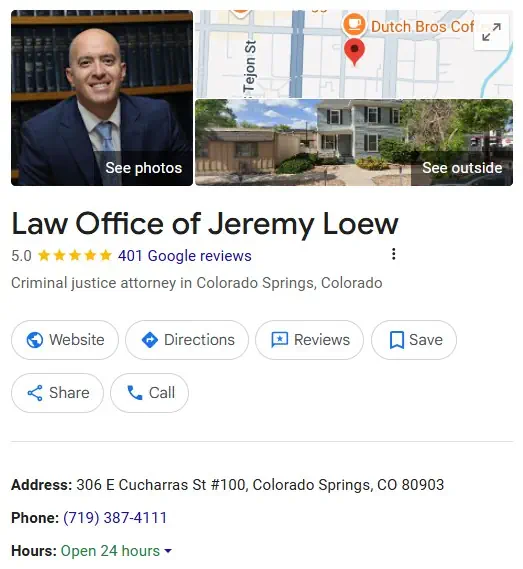Understanding Search and Seizure Laws in Colorado
An Overview of Search and Seizure Laws in Colorado
Search and seizure laws are fundamental to the legal system in the United States, rooted in the Fourth Amendment to the U.S. Constitution. These laws aim to balance the need for effective law enforcement with the protection of individual privacy rights.
Colorado adheres to federal constitutional principles but also has state-specific statutes and case law that further define the scope and limitations of search and seizure practices.
Here we explore the key aspects of search and seizure laws in Colorado, providing essential information for criminal lawyers practicing in the state.
Constitutional Foundation: The Fourth Amendment
The Fourth Amendment of the U.S. Constitution guarantees the right of individuals to be secure in their persons, houses, papers, and effects against unreasonable searches and seizures. It establishes the requirement of probable cause and judicial oversight through warrants. Similarly, Article II, Section 7 of the Colorado Constitution provides equivalent protections, often interpreted in tandem with federal standards.
Key Principles of Search and Seizure in Colorado
Probable Cause and Warrants
In Colorado, law enforcement officers must generally obtain a search warrant supported by probable cause before conducting a search or seizure. Probable cause exists when there is a reasonable belief, based on factual evidence, that a crime has been committed and that evidence of the crime is present in the location to be searched.
Warrants must describe with particularity the place to be searched and the items to be seized.
Exceptions to the Warrant Requirement
Like other states, Colorado recognizes several exceptions to the warrant requirement, including:
- Consent Searches: If an individual voluntarily consents to a search, no warrant is required. The consent must be clear and not coerced.
- Search Incident to Lawful Arrest: Law enforcement may search a person and the immediate area within their control without a warrant when making a lawful arrest.
- Plain View Doctrine: Officers may seize evidence without a warrant if it is in plain view, the officer is lawfully present, and the incriminating nature of the evidence is immediately apparent.
- Exigent Circumstances: A warrantless search is permissible in emergencies where there is an immediate threat to safety or a risk of evidence destruction.
- Automobile Exception: If probable cause exists, officers may search a vehicle without a warrant due to its inherent mobility.
- Stop and Frisk (Terry Stops): Under Terry v. Ohio, officers may conduct a limited pat-down search for weapons if they have reasonable suspicion that a person is armed and dangerous.
Reasonable Expectation of Privacy
Colorado courts adhere to the principle that the Fourth Amendment protects areas where an individual has a reasonable expectation of privacy. This includes homes, personal belongings, and certain digital communications. Conversely, there is generally no reasonable expectation of privacy in public spaces, abandoned property, or information voluntarily shared with third parties.
Digital Searches and Modern Challenges
With the advent of digital technology, Colorado has seen evolving case law regarding searches of electronic devices and data. In People v. Gutierrez (2016), the Colorado Supreme Court emphasized that searches of cell phones and similar devices often require a warrant due to the vast amount of personal information they contain.
Lawyers must stay informed of developments in this area, as courts continue to address issues like geofence warrants, social media searches, and the use of surveillance technology.
Suppression of Evidence: The Exclusionary Rule
Evidence obtained through an illegal search or seizure may be inadmissible in court under the exclusionary rule. Colorado courts strictly apply this doctrine to deter police misconduct. Additionally, the “fruit of the poisonous tree” doctrine may bar evidence derived from an unlawful search or seizure. However, exceptions such as the good faith exception or inevitable discovery rule may apply in certain cases.
Colorado has unique elements in its search and seizure jurisprudence. For example:
- Marijuana Laws: The legalization of recreational marijuana in Colorado introduces complexities in probable cause determinations. The odor of marijuana alone may not always justify a search, depending on the circumstances.
- Roadside Sobriety Checks: Colorado permits DUI checkpoints, but they must comply with constitutional requirements. Checkpoints must be conducted in a non-discriminatory manner, with clear guidelines and minimal intrusion.
- Firearm Searches: Colorado’s laws on firearms, including concealed carry regulations, can influence the legality of searches related to weapons possession.
Practical Considerations for Criminal Defense Attorneys
For criminal lawyers in Colorado, understanding search and seizure laws is critical to effectively defending clients. Key considerations include:
- Challenging Probable Cause: Defense attorneys should scrutinize the basis for probable cause in warrant applications or warrantless searches.
- Evaluating Consent: Determining whether consent was voluntary and informed can be pivotal in suppressing evidence.
- Cross-Examining Officers: Questioning law enforcement’s adherence to protocol and constitutional standards can reveal weaknesses in the prosecution’s case.
- Keeping Updated: Given the dynamic nature of search and seizure law, lawyers must stay informed about new legal precedents and legislative changes.
Search And Seizure Laws – A Delicate Balance
Search and seizure laws in Colorado reflect a delicate balance between law enforcement objectives and the constitutional rights of individuals. For criminal lawyers in Colorado, mastering these principles is essential for advocating effectively on behalf of clients.
By understanding the nuances of Colorado’s legal landscape and remaining vigilant about emerging issues, attorneys can ensure that justice is served while safeguarding the fundamental rights enshrined in the Constitution.

Colorado Springs Criminal Attorney And DUI Lawyer Jeremy Loew
DUI Attorney Free Consultation
DUI Attorney Free Consultation Get Your Free Consultation With Top Colorado Springs DUI Attorney! Find The Best DUI Lawyer In Colorado...
Appeal Driver’s License Suspension in Colorado
Appeal A Driver's License Suspension in ColoradoHow To Appeal A Driver's License Suspension In Colorado You have the right to appeal a driver's...
Failed A Breathalyzer Test?
Failed A Breathalyzer Test?Failed A Breathalyzer Test? With the possibility of facing serious legal consequences after failing a breathalyzer test...

